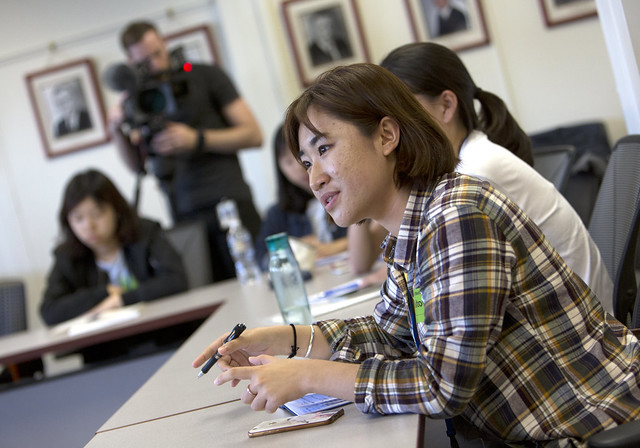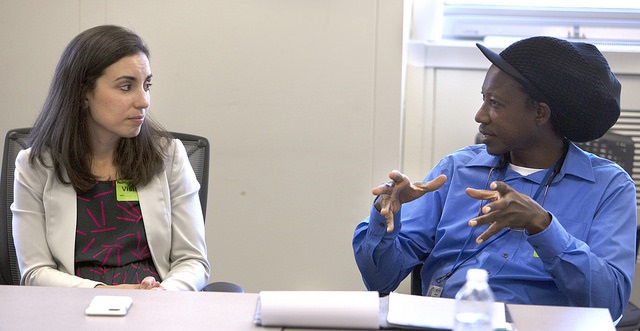Exchanging perspectives: international students see U.S. health care in new light

By Carolyn Kimmel
As a first-year medical student in Taiwan, Sandra Tsai is learning firsthand about American health care and insurance coverage through Penn State College of Medicine’s Global Health Exchange Program (GHEP)—and realizing her preconceptions don’t always match with reality.
“The most impressive thing I learned about America is that the insurance system is so complicated and the cost of medical care is so high,” she said.
Tsai and nine other international students from Taipei Medical University, China Medical University and the University of West Indies-Cave Hill in Barbados came to the Hershey campus in July to gain a global perspective on an array of public health-related issues.
Under GHEP, administered by the Department of Public Health Sciences, Penn State and international academic institutions collaborate with the common goal of better understanding global health care systems, public policies, health inequities and diseases.
For many of the international students, it was the first time they heard about the complexities of American health care. Better care, they learned, comes at a price.
“In Taiwan, insurance puts many restrictions on hospitals, and medical caregivers aren’t treated very well. That’s the consequence of low price,” Tsai said. “U.S. health care providers are treated much better.”
“As public health students, we should try to improve the situation,” agreed Yu-Hsiang Chiou, a public health and nutrition student from Taiwan.
The international students who came to Hershey heard lectures from College of Medicine administrators and professors on the state of medicine in America, U.S. medical education and challenging issues such as obesity, poverty and infectious diseases.
“We want to engage learners early in their education to consider how different health systems compare to theirs in their home country,” said Kristin Sznajder, assistant professor and associate director of international initiatives. “Ultimately, we want the students to think about how they can take lessons learned from here and apply them there, and vice versa.”
During their two-week visit, the international students traveled to the state Capitol in Harrisburg to meet with legislators and members of the Pennsylvania Department of Health leadership team, including Secretary of Health Dr. Rachel Levine.
 See photos of the Department of Health meeting on the Medical Center’s Flickr page.
See photos of the Department of Health meeting on the Medical Center’s Flickr page.
“Sitting down with international students to discuss public health topics in Pennsylvania provides insight that our concerns here in the U.S. are similar to those in their home countries,” Levine said.
Noting that public health decisions made on a local and state level can have major ramifications internationally, Levine said such education is important.
Students also learned about the importance of tailoring communication and messaging to a target audience—something they said they had not learned in their courses back home.
Sitong Cui, a public health student from China, said a highlight of the program was a tour of the Clinical Simulation Center at Penn State Health Milton S. Hershey Medical Center.
“We don’t have any courses that include simulation experiences because of the cost,” she said. “I think it’s very important as a way to get more experience.”
The trip wasn’t all business. The international students also got to experience the thrill of a rollercoaster ride at Hershey Park, a concert by the pop rock band Maroon 5 and a Harrisburg Senators baseball game.
In addition to hosting international students, the two-way program offers Penn State students, enrolled in the Master of Public Health and Doctor of Public Health programs, the opportunity to study abroad.
To help shape the program, Dr. Benjamin Fredrick, director of the College of Medicine’s Global Health Center, lent his expertise from the Global Health Scholars Program, another cross-cultural program offered to medical students by the College of Medicine. This year, Penn State students traveled abroad to analyze the burden of tuberculosis in India and Sri Lanka and study mental health facing vulnerable populations in China.
The Department of Public Health Sciences started GHEP three years ago because of students’ growing interest in global health practicums at international sites, said Julie Lentes, public health sciences instructor.
“The cultural experience is an exciting opportunity for graduate students to gain a global perspective on health care challenges in other societies,” Lentes said. “It makes our students well-rounded and better able to understand issues facing diverse populations and how their interventions might to be applied to the U.S. public health system.”
To learn more about the GHEP program, including how students can apply, visit the College of Medicine’s Master of Public Health webpage or email Sznajder at ksznajde@phs.psu.edu.

Julie Lentes, left, public health sciences instructor at Penn State College of Medicine, listens as Lyndon Waterman, a student from the University of the West Indies in Barbados, discusses global health issues.
If you're having trouble accessing this content, or would like it in another format, please email Penn State Health Marketing & Communications.
